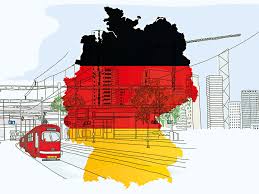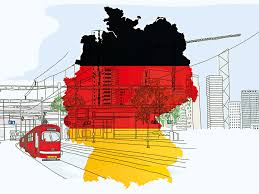
The unexpected slowing down of the factory activities in German for the month of July is being viewed as a reflection of the evidence that the aggressive trade policies and decision of United States President Donald Trump is having an impact on the confide3nce of the industries and business.
There was a fall of 0.9per cent in the industrial orders for July compared to the figure from a month earlier according to the data that was released by the German Federal Statistics Office on Thursday But, according to estimates and anticipation of the market, the country was expected to lodge a growth of 1.8 per cent.
A significant drop in foreign orders which recorded a fall of 3.4 per cent in July compared to that in June, was the primary reason for the decrease in industrial orders for July in Germany. There was a drop of 4.0 per cent in orders for German goods from consumers from outside of the euro area
Trump has been very critical of German exports and have alleged that the country’s exports have been gaining advantage of a low euro that had been kept low artificially and that this trend was resulting in a drop in domestic production in the US. Threats of imposition of tariffs on the influential auto sector in of Germany have also been issued by Trump.
While on one hand, there was a drop in the foreign orders for German goods, there was an increase in the domestic demand in the country which rose by 2.4 per cent. This was supportive of a separate report that estimated that the largest economy of Europe would continue to grow.
Based on reports of a stronger than expected growth in the first half of the year, the Ifo Institute for Economic Research has increased its estimates for the growth of the German economy for the full year of 2018 to 1.9 per cent from 1.8 per cent that it had previously estimated.
Over the nest two years, private consumption and domestic demand would be the main drivers for the growth in the gross domestic products of Germany, Ifo said in a statement. The economy would also be benefitted by "rising employment and strong income growth."
Researchers noted a small enhancement in business sentiments in August this year after the positive meeting between the European Commission President Jean-Claude Juncker and Trump, said Klaus Wohlrabe, deputy director at the Ifo Center for Macroeconomics and Surveys.
However, Wohlrabe warned that the German business views that temporary agreement between the two leaders of not going ahead with imposition of tariffs for the time being as "just a truce, with the war not over."
At the same time, there are analysts who noted that Ifo and reported an increase in uncertainty among CEOs despite the firm persisting with a positive outlook for the German economy for the entire year.
(Source:www.cnbc.com)
There was a fall of 0.9per cent in the industrial orders for July compared to the figure from a month earlier according to the data that was released by the German Federal Statistics Office on Thursday But, according to estimates and anticipation of the market, the country was expected to lodge a growth of 1.8 per cent.
A significant drop in foreign orders which recorded a fall of 3.4 per cent in July compared to that in June, was the primary reason for the decrease in industrial orders for July in Germany. There was a drop of 4.0 per cent in orders for German goods from consumers from outside of the euro area
Trump has been very critical of German exports and have alleged that the country’s exports have been gaining advantage of a low euro that had been kept low artificially and that this trend was resulting in a drop in domestic production in the US. Threats of imposition of tariffs on the influential auto sector in of Germany have also been issued by Trump.
While on one hand, there was a drop in the foreign orders for German goods, there was an increase in the domestic demand in the country which rose by 2.4 per cent. This was supportive of a separate report that estimated that the largest economy of Europe would continue to grow.
Based on reports of a stronger than expected growth in the first half of the year, the Ifo Institute for Economic Research has increased its estimates for the growth of the German economy for the full year of 2018 to 1.9 per cent from 1.8 per cent that it had previously estimated.
Over the nest two years, private consumption and domestic demand would be the main drivers for the growth in the gross domestic products of Germany, Ifo said in a statement. The economy would also be benefitted by "rising employment and strong income growth."
Researchers noted a small enhancement in business sentiments in August this year after the positive meeting between the European Commission President Jean-Claude Juncker and Trump, said Klaus Wohlrabe, deputy director at the Ifo Center for Macroeconomics and Surveys.
However, Wohlrabe warned that the German business views that temporary agreement between the two leaders of not going ahead with imposition of tariffs for the time being as "just a truce, with the war not over."
At the same time, there are analysts who noted that Ifo and reported an increase in uncertainty among CEOs despite the firm persisting with a positive outlook for the German economy for the entire year.
(Source:www.cnbc.com)





